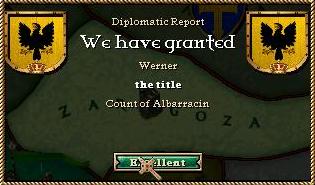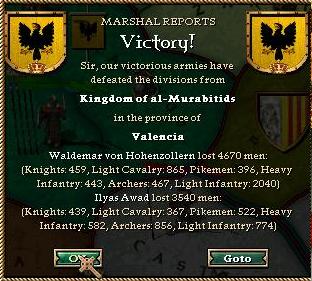Part 8: Crusader Kings: Chapter 8 - The Third Crusade: 1109 - 1113
1109 - 1113: The Third Crusade
The Third Crusade is called in late 1109 to liberate Burgos from the heathens and stop their advance across Iberia. With Poland still waging their long, grinding war against Polotsk, Hungary and France beset by internal strife and England not on the best of terms with the Pope, it is now up to the Holy Roman Empire alone to defend Christianity against the muslims.

Emperor Waldemar spares little time declaring war on the occupiers of Burgos, drawing together 30,000 men from his demesne in Genoa and Provence, and urging his vassals to take up the cross and muster their own forces.


The first German soldiers make landfall at Valencia in February of 1110. Most of the heathens are flocked around the border to Navarra, and only a small rearguard is holding the Sultan's ruling seat. They are quickly routed.


Back in Germany, Empress Eve hosts a grand feast for all of Waldemar's vassals in celebration of the Crusade, hoping that more of them will take up the cross. It proves only moderately successful.

With Valencia in the Crusaders' hands, the army is split in two to take the neighbouring provinces of La Mancha and Denia. To the north, the second army, led by Waldemar himself, has just made landfall in Barcelona.


Some news from home: Albrecht, the son of an unimportant courtier who has managed to endure both regular illnesses and pneumonia, is showing an instinct for tactics and warfare that exceeds that of most adults. He is spoken of as a prodigy, and a future marshal for Germany's armies.

The French rebels have sacked Paris, and another Duke in the south has declared independence. It seems unlikely at this point that the French king will manage to keep his realm together.

Denia and La Mancha quickly fall to our forces, the despirited muslim armies offering no resistance at all.

Five thousand Crusaders enter Toledo, only be faced with a muslim army three times their size - Waldemar had hoped that King Zigza would split his forces to meet the threat from the Crusaders attacking from Barcelona, but the muslim ruler appears to have a decent grasp of warfare, and has opted to try and deal with the Crusaders one army at a time.

Faced with such overwhelming numbers, Waldemar's men can do little but retreat.

Back in Germany, a good half of Waldemar's vassals have joined the Crusade, and a steady stream of ships are leaving the harbors of Liguria, headed towards Valencia. Waldemar has also sent orders for the large Army of Milano to be mustered.

Meanwhile, the two parts of the first Crusader army have managed to join forces again at La Mancha, and have repelled an advance force sent by King Zigza.

Albarracin falls to Waldemar, and a loyal knight who showed courage during the fighting is made its count.


King Zigza gathers his his entire army for a second attack on La Mancha. The Crusaders make a brave stand, but are ultimately forced to retreat with heavy losses, and La Mancha falls into heathen hands once more.

Seemingly unstoppable, Zigza's army brush aside what few defenders remain in Valencia, and begin laying siege to the port. If Valencia falls, the muslims will be able to pick off the scattered crusading armies heading there one by one, effectively strangling the flow of manpower. Waldemar immediately turns his army south on hearing the news, abadoning the gains he had made in Navarra.

Waldemar's men descend on the numerically superior forces of King Zigza, and despite horrendous losses, manage to drive them back with a series of reckless charges.

A muslim counterattack fails to dislodge Waldemar from Valencia, and soon enough, thousands of men from the various rulers of the Empire add their forces to the Crusade, driving the muslims before them and capturing La Mancha and Toledo.

Molina is next to fall, even as news reach Waldemar that the Saxony and Holland have landed troops in north Iberia and are now marching on Burgos.

More lands continue to fall to the Crusaders, and the al-Murabatids now control only the immediate area around Burgos.

Still, the war drags on, and as the year turns to 1112, Waldemar begins feeling the absence of female company. The result is a bastard boy by the name of Werner.

Just as Waldemar's troops cross the border into Burgos, disaster strikes - the conniving muslim king has paid off one of Waldemar's commanders with gold and the promise of lands. The foul traitor vanishes south, along with half of Waldemar's army.

However, this is a last ditch attempt, and ultimately makes little difference. Burgos falls to the troops of Holland, mere days before Waldemar reaches the city.

Perhaps inspired by the Crusade in Iberia, the Kingdom of Sweden has launched their own little crusade against the pagans in Lithaunia. The result is the creation of a new knightly order, the Teutonic Order, mainly composed of Danish and North German noblemen who have taken oaths of chastity and poverty. After some conflicts about its leadership, the Order approaches a distant cousin of Emperor Waldemar, offering him the position of Grandmaster. He turns it down, explaining that his sword arm is needed in Iberia. Instead, the Grandmaster ends up being the eldest son of one of the many German noble houses who lost their lands to Heinrich the Heretic: Otto von Habsburg.

Down in Iberia, the fall of Burgos has drawn the Muslim Kingdom of Hammahid into the war, as the Hammahid King declares war on the Duke of Holland and Waldemar declares war on him in turn. Controlling Granada and a sizeable amount of land in Algeria, the Hammahids are a powerful foe, but the Crusaders still have numbers on their side. Only a week later, however, the third muslim power in Iberia, the Emirate of Sevilla, declares war as well.

An overview of the Crusade as a whole. Waldemar is having some trouble trying to group enough soldiers to meet the Hammahid advance in the south, since most of the German vassals seem to think that the war is over now that Burgos has fallen, and are going home.

An attack towards Burgos is repelled only at the cost of the German Chancellor's life, as an arrow from a muslim horse archer strikes his armor in a weak spot.

The Hammahid Sheik of Cuenca is defeated, and the province is given to a German nobleman.

1113 begins with news of the worst sort, as the Archbishop of Bavaria decides that he has had enough of Imperial rule, and revolts.

This is the last straw for Waldemar, who is already facing more and more calls from his vassals to declare the Crusade at an end. Carinithia and Genoa seem ready to join Bavaria in revolt, and Waldemar is not about to let Germany erupt into civil war again just to gain a few more Iberian provinces. A peace deal is brokered with King Zigza, demanding Molina, Soria and Leon for Germany.

King Zigza accepts.

More loyal knights are made into Counts, and there is now a fairly large German realm in Iberia that both connects the Iberian christians and serves as a buffer against any further Muslim advances. Leaving a large force behind to garrison against Hammahid or Sevillian attacks on Burgos, Waldemar rushes home to put out the fires of revolt.

An illness is spreading through the royal court at home, infecting several courtiers along with Empress Eve and Waldemar's infant bastard son Werner. Werner succumbs to the illness a short while later, continuing the long string of misfortunes that seem to afflict nearly all male children of the Hohenzollern dynasty.

With Waldemar back in Germany, the royal armies are quickly mustered and sent into Bavaria, crushing the rebel Archbishop's forces, and bringing the rebellion to a quick close.


In a move that takes his vassals by surprise, Waldemar declares that the Grand Duchy of Bavaria, with its long history of risings against the crown, will not be reformed. Instead, Bavaria is folded into the tiny but fiercely loyal Duchy of Austria, which becomes the Grand Duchy of Austria.

In August of 1113, the war in Iberia putters out, with both Sevilla and the Hammahids offering peace to the Crusaders. Burgos is saved, and the Pope declares the Third Crusade to be over.

Deus Vult.